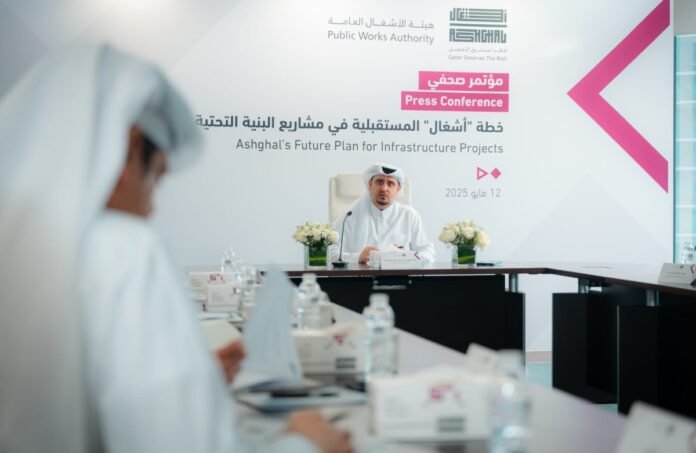Doha, Qatar – The Public Works Authority (Ashghal) has launched a massive five-year development plan valued at over QR81 billion. This new initiative covers a wide range of vital Ashghal infrastructure projects, including land development, government buildings, and strategic drainage systems.
During a recent press conference, Ashghal President Engineer Mohammed bin Abdulaziz Al Meer revealed the key elements of the Ashghal infrastructure projects plan. He emphasized that this is the largest investment cycle in Ashghal’s history, both in value and scope. The program, set for 2025–2029, builds on Qatar’s past achievements and continues the momentum gained during the 2022 FIFA World Cup.
The ambitious roadmap includes full infrastructure works for citizen land plots, incorporating modern urban concepts that improve quality of life. It also prioritizes the construction of essential government buildings in the health, education, culture, and sports sectors as part of the Ashghal projects.
Al Meer confirmed that Ashghal will develop advanced sewage and rainwater networks. These efforts include such Ashghal infrastructure projects as building strategic tunnels and treatment stations to prevent flooding and improve drainage efficiency.
One highlight is the strategic outfalls project, which will manage rainwater sustainably in northern and southern Doha. The innovative project will be implemented in two phases, starting in 2025 with main tunneling, followed by sub-tunneling in 2026. Ashghal is working closely with the Ministry of Municipality and the Ministry of Environment and Climate Change to ensure infrastructure success.
As part of Qatar’s push for private sector engagement, Ashghal will also launch public-private partnership projects. This includes developing infrastructure for 5,500 residential plots. These Ashghal infrastructure efforts will connect roads, install street lighting, and provide complete sewage and landscaping services.
Plans are also underway for a second phase of the Al Wakra and Al Wukair wastewater treatment plants under a similar partnership model, which is all part of ongoing Ashghal developments.
Al Meer addressed delays in some projects and said Ashghal will take corrective actions for infrastructure development. This includes evaluating contractors’ performance and ensuring quality and timely completion.
The government has allocated QR21 billion to support the contracting sector’s infrastructure projects. Measures include easier payments, contract extensions, and bank guarantees instead of reserve deposits.
Ashghal is also expanding its local value program (ICV). The number of local suppliers grew from 201 in 2022 to 733 by late 2024. Local contracts for Ashghal infrastructure projects have risen to 77%, showing a strong push toward economic self-reliance.
Digital transformation is another focus area within Ashghal projects. Ashghal launched an automated financial database to speed up tendering and improve oversight. A smart contract system is also being developed to reduce infrastructure costs and boost transparency using digital technologies.
Ashghal’s strategy from 2024 to 2030 aligns with Qatar’s National Vision 2030. A new visual identity will reflect this future direction, all while focusing on infrastructure. Al Meer said the authority aims to become a global leader in project and asset management. It seeks to offer high-quality services and build sustainable infrastructure for future generations as part of Ashghal initiatives.
Ashghal infrastructure projects remain central to Qatar’s goal of ranking among the world’s most developed nations. Through innovation, sustainability, and digital transformation, Ashghal is paving the way forward.


